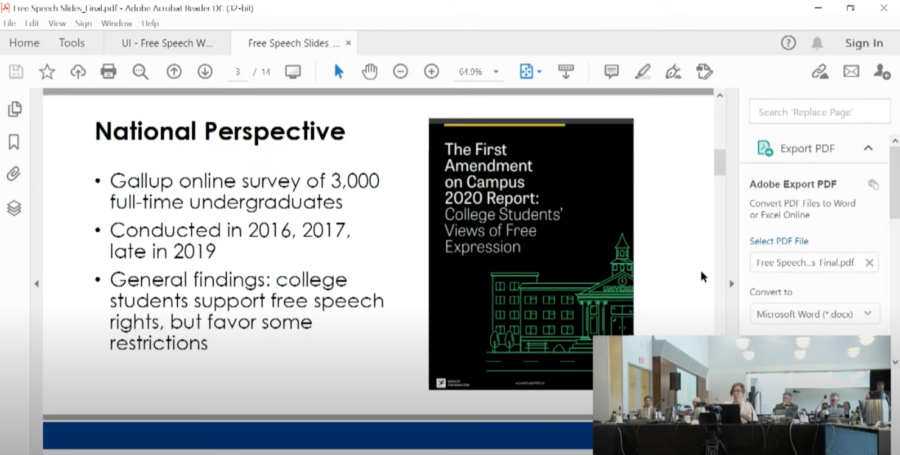Free Speech Committee reviews campus climate surveys, updated required training
National free speech survey data from a June Board of Regents meeting suggests that university students support the First Amendment but with some restrictions.
June 3, 2021
On Wednesday at the Iowa Board of Regents meeting, the Free Speech Committee addressed reviews and updates for free speech components on the major Iowa public campuses. Regent Greta Rouse gave the opening remarks before discussing the proposed agenda items, and she recognized the importance of free speech in university atmospheres.
“Free speech is a hallmark of our society, and in higher education, it is absolutely critical that we not only protect that right, but we have it appropriately embedded in the education that students receive,” Rouse said.
In February, 10 recommendations were created for managing free speech on university grounds, and progress will continue to be monitored as the recommendations are implemented by the Free Speech Committee.
The committee had each university provost review the syllabus statements created to address the significance of free speech on campus, and Iowa State’s Senior Vice President and Provost Jonathan Wickert mentioned the implementation of the university’s free expression statement.
Wickert announced the syllabus statement to all faculty in November 2020 as well as the requirement that it be used in all classes, and it was added immediately for the winter class sessions as well as in the spring semester. The reaction to the new syllabus statement was positive, and Wickert noted that it was merely an addition to the already very clear understanding that students always have protected free speech while on campus.
The Free Speech Committee also discussed the creation and use of free speech training modules that would need to be required for all three major public universities.
For the first year that the new training module is implemented, it will be required, but due to the logistics involved with requirements for students, there is no anticipated penalty for students who do not complete the training. Instead, encouragement and reminders to finish the free speech training will be utilized due to the fact that schools are in a transition period from not having the training to suddenly having it.
The committee lastly addressed the update for the free speech surveys that were used to collect data about students’ thoughts regarding their First Amendment rights on campus.
According to Board of Regents Chief Academic Officer Rachel Boon, the general consensus from the data gathered was that on a national scale, students do in fact support the First Amendment but with some restrictions. Boon stated that although students may favor some free speech restrictions, legally, this does not necessarily constitute the restriction of speech.
When reflecting Iowa State’s campus climate survey from 2017 with over 7,000 respondents, it was found that 79 percent of students felt “comfortable” or “very comfortable” on campus, with 29 percent observing conduct that was “exclusionary, intimidating, offensive and/or hostile.”
Boon wanted to clearly mention that the time in which the free speech survey was conducted was a much different atmosphere than what we have seen today, and it cannot account for how all students on Iowa State’s campus today would respond to the same questions.

















